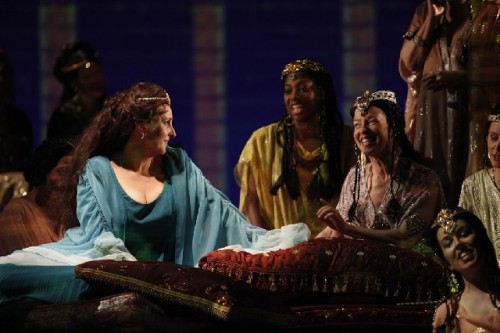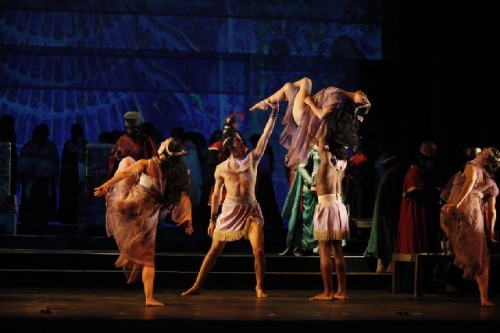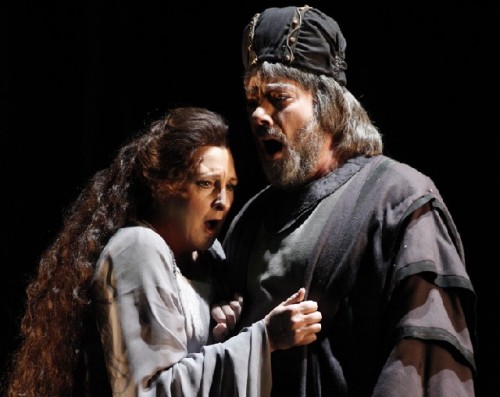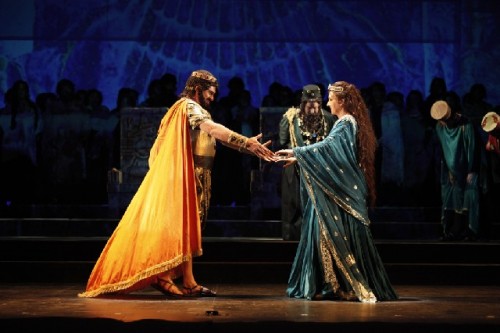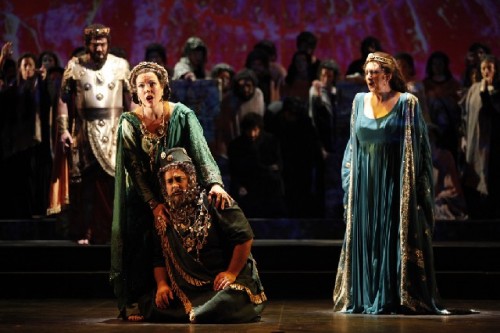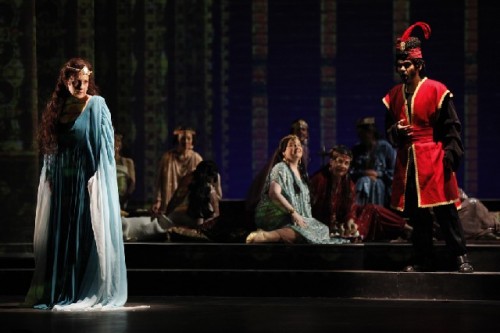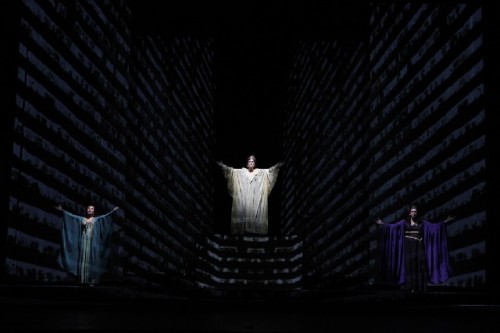Esther at the New York City Opera
Lauren Flanigan and Stephen Kechulius Magnificent
By: Susan Hall - Nov 09, 2009
Esther
New York City Opera
David H. Koch Theater, Lincoln Center
Hugo Weisgall, composer
Charles Kondek, librettist
George Manahan, conductor
Cast: Lauren Flanigan, Esther
Stephen Kechulius, Xerxes
Roy Cornelius Smith, Haman
Beth Clayton, Vashti
Gerald Thompson, Hegai
Esther, the dramatic and beautiful opera by 20th century American composer Hugo Weisgall, opened the New York City Opera season in Lincoln Center on Novemnber 7. The opera had its world premiere at the City Opera over a decade ago.
The magnificent soprano, Lauren Flanigan, reprised the title role. George Manahan conducted, seamlessly integrating the orchestra and a stage filled with eight principals and a chorus representing the "Jewish people."
In this adaptation of the inspiring Biblical story, Esther develops as a character, at first a girl who can't see compromise on any issue, then becoming a woman who uses sexual attractiveness to save her people. The opera's librettist, Charles Kondek, worked closely with Weisgall on the dramatic structure.
English is not a naturally musical language and Kondek takes advantage of every opportunity to use words which lilt, resonate, and shine. Repetition of such phrases as "We are responsible," haunts.
Weisgall had left cousins behind in Europe and they did not survive. He had an acute sense of responsibility. After the war, when the US government posted him in Prague to help process exit papers, he was offended one day by an arrogant and insistent man dressed in concentration camp garb. He asked, "Why should I give you papers," and the man drew his arms from behind his back and held out two stumps where his hands would have been. "I was a pianist." The papers were issued immediately. Some of the intense passion of Esther must come from these moments in the composer's life.
Flanigan's Esther takes advantage of the score and libretto's arc. In this production, she is on spot hitting the many high notes she has to take on a leap of faith. When one soprano suggested to Weisgall that the part was awfully high, he replied, "You're supposed to be a soprano."
Do not be put off by the opera's designation "atonal." It simply means that the music is not rooted in conventional Western keys. This sometimes feels like there are no resolutions. Composers of the second Vienna school used this form in part because they felt it reflected the nature of the modern world.
Weisgall grew up in a Central Europe where his father sang both lieder and Jewish prayers. You can hear the familiar "Die Lorelei" of Schumann and Weisgall's favorite lullaby, a Schubert -- "May you sleep wrapped in the pure sounds of love," subtly reflected in the music.
Melodies, themes, and beautiful arias, duets and trios abound. The trio sung by two of Xerxes' wives and Lady Macbeth's predecessor, Zeresh, is simply gorgeous. Weisgall's daughter referred to his music as "a joyful noise." Even if you resist the sound, you'll surely be swept up by its joy.
The opera, directed by Christopher Mattallano, uses many film techniques. Mattallano picks up on time warps which skirt back and forth in the libretto. In a lovely duet between Esther and Xerxes, Esther tells a story, past and present, as Xerxes responds in the moment. These devices enhance rather than obscure. They help make the opera, whose dramatic drive impels us forward, fascinating.
All the principals in the cast sing with a visceral intensity. Beth Clayton, wonderfully hot and wicked as Xerxes discarded first wife -- cast off the throne because she refused to stand naked before the Persian people and be treated as a clown. She plots to get back at Xerxes. Margaret Thompson's performance as Zeresh is also notable, as she eggs her husband on to provide for the future of their sons . She urges him to eliminate as many obstacles as possible, including all the Jews in Persia.
The sets are projected on screens. Taking advantage of the ease this provides for change, continuously altered visual delights surround the performers. From a jungle of green leaves punctuated by purple sweet peas, in the opening scene, to a harem wrapped in exotic Persian designs, Jerome Sirlin's projections entrance. Why should this surprise since he's credited with designs for Madonna, Hershey Park, and Disney, eroding any resistance to this production as "inaccessible."
Esther, of course, is a heroine not only of the Biblical Jews but of all women. Ruth, her predecessor, was confronted by an easier problem. Left financially destitute by her husband's death, her practical mother-in-law sends her to sleep with an eligible bachelor and all problems are solved. On we go to Deborah and Joan of Arc. One internet commentator's list of women who saved their people ends with Sarah Palin. Not likely.
It's a particular pleasure to see an opera company adhere to the first two commandments of operatic production. All the voices are beautiful and appropriate for their roles. The singers are emotionally present, arcing through the drama of the story. The sound of the reconstructed house is not perfect, but singers say that every stage has its sweet spots. Clearly in this house any position stage front - where many of the arias and ensemble singing take place - is just fine.
"Esther" is a treat, moving us on many levels. Recently, while leaving the entertainment section of the Museum of Jewish Heritage, my companion, Paul, turned to me, "What would American arts be without us?" I, a classic Wasp, was hard pressed to find appropriate words of thanks and so I gave him a more than a grateful hug.
We all share these stories from the Bible. Weisgall told Esther's story to echo recent history . Esther grows out of an operatic tradition expressed by Fidelio Beethoven's opera on political oppression (on which he worked harder than any other piece he composed). Verdi's Nabucco" focused on the oppression of the Jews featuring a chorus as character.
Esther is very much its own take. Go and enjoy it. Performances are repeated on November 13 (8 pm), 15 (1:30 pm), 17 (8 pm),19 (8 pm).

